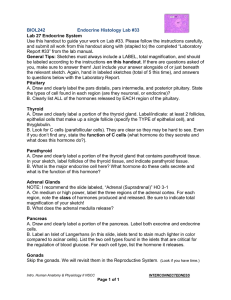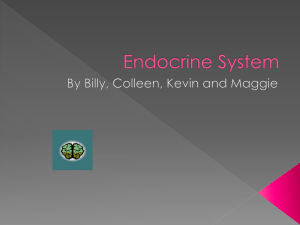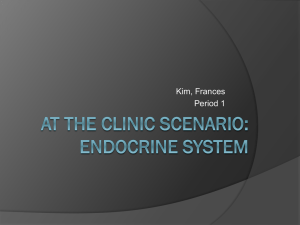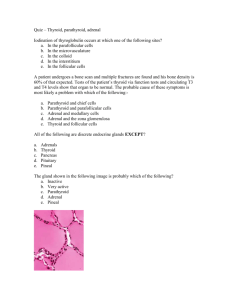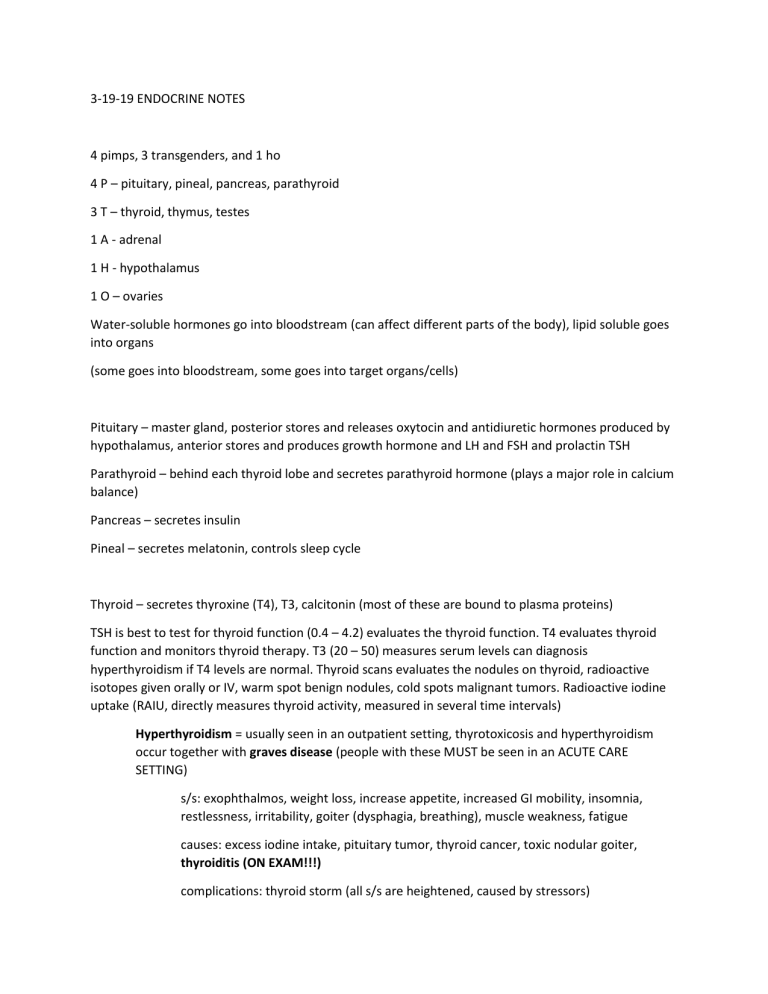
3-19-19 ENDOCRINE NOTES 4 pimps, 3 transgenders, and 1 ho 4 P – pituitary, pineal, pancreas, parathyroid 3 T – thyroid, thymus, testes 1 A - adrenal 1 H - hypothalamus 1 O – ovaries Water-soluble hormones go into bloodstream (can affect different parts of the body), lipid soluble goes into organs (some goes into bloodstream, some goes into target organs/cells) Pituitary – master gland, posterior stores and releases oxytocin and antidiuretic hormones produced by hypothalamus, anterior stores and produces growth hormone and LH and FSH and prolactin TSH Parathyroid – behind each thyroid lobe and secretes parathyroid hormone (plays a major role in calcium balance) Pancreas – secretes insulin Pineal – secretes melatonin, controls sleep cycle Thyroid – secretes thyroxine (T4), T3, calcitonin (most of these are bound to plasma proteins) TSH is best to test for thyroid function (0.4 – 4.2) evaluates the thyroid function. T4 evaluates thyroid function and monitors thyroid therapy. T3 (20 – 50) measures serum levels can diagnosis hyperthyroidism if T4 levels are normal. Thyroid scans evaluates the nodules on thyroid, radioactive isotopes given orally or IV, warm spot benign nodules, cold spots malignant tumors. Radioactive iodine uptake (RAIU, directly measures thyroid activity, measured in several time intervals) Hyperthyroidism = usually seen in an outpatient setting, thyrotoxicosis and hyperthyroidism occur together with graves disease (people with these MUST be seen in an ACUTE CARE SETTING) s/s: exophthalmos, weight loss, increase appetite, increased GI mobility, insomnia, restlessness, irritability, goiter (dysphagia, breathing), muscle weakness, fatigue causes: excess iodine intake, pituitary tumor, thyroid cancer, toxic nodular goiter, thyroiditis (ON EXAM!!!) complications: thyroid storm (all s/s are heightened, caused by stressors) interventions: remove stressors if pt exp thyroid storm (don’t just call the doc), for thyrotoxicosis (admin med to block hormone, provide quiet room, fluid and electrolyte, elevate head of bed, watch for cardiac arrhythmias, give IV fluids for thyroidtoxicosis) dx: decreased TSH levels and elevated T4 levels (lab values proving hyperthyroidism) RAIU tests used to differentiate Graves disease from other forms of illness!!! Collaborative care: stop over secretion of hormones (drug PTU and Tapazole are given, they stop synthesis of thyroid hormone and blocks the synthesis of T4 to T3 but takes several weeks to be effective, used long term) (Post-op: Can also use iodine, large doses rapidly stop synthesis of T3 to T4, decrease the vascularity of the thyroid gland, not used for long-term, takes 1-2 weeks to work) (Can also use beta blockers such as propanolol, used for symptomatic relief) Synthroid for hypothyroid TX: radioactive iodine treatment preferred by nonpregnant peeps, damages the target thyroid tissue, max affect occurs in 2-3 months, at risk for hypothyroidism Post tx: must take hormonal supplements for the REST OF THEIR LIFE Surgical: subtotal thyroidectomy (90% of thyroid will be removed, if too much tissue is taken the tissue will NOT regenerate) Teaching: They must eat high calorie 4-5000 diet pre-treatment, AVOID caffeine KNOW THESE, post op (assess pt every 2 hours for 24 hours for s/s of hemorrhage or tracheal compression), monitor for low SaO2 and RR, place pt in semi fowler, avoid flexion of neck, assess for signs of tetany, hoarseness after 3-4 days is bad get it checked Discharge: adequate diet and iodine, avoid high temps, get follow up, will get life-long thyroid treatment for total thyroidectomy, if had radioactive iodine therapy may have dryness and irritation in mouth and throat Hypothyroidism = iodine deficiency, insufficient circulating thyroid hormone or atrophy of thyroid gland muscle, associated with Hashimoto’s disease, or from treatment of hyperthyroidism s/s: myxedema (dull, swollen, puffy) complications: myxedema coma (from infection, doing drugs, tranquilizers, too cold, low bp, low respiratory) is a medical crisis needs immediate intervention diagnosis: inc in serum TSH if thyroid has problems and dec TSH if pituitary or hypothalamus problem. Give TRH injection to see if there is hypothalamic dysfunction, TSH will increase after this collaborative care: serum TSH and T4 and T3 and TRH stimulation test and monitor thyroid hormone levels, maybe do thyroid hormone replacement (Synthroid), monitor for chest pain, nutritional therapy to have weight loss. Nursing management: early detection (watch for weight gain, mental changes, fatigue, cold intolerance, skin changes, assess for recent introduction of iodine, assess for bradycardia, distended abd, and muscle aches). Usually managed in outpatient setting except for myxedema coma (acute care, mech respiratory support, cardiac monitoring, thyroid replacement IV, monitor core temp, I and O, edema, activity level) Education: need life long drug therapy. Thymus – look up on own Testes – produces testosterone Hypothalamus – located in brain, can release and stop hormones (what ever is in the brain that is secreting something, it will affect the nervous system) Adrenal Cortex – secretes all the steroids (gluco-, mineral-, cortico-steroids) (controls sugar, fluid electrolyte, steroids…) Adrenal Glands – medulla and cortex two parts (medulla secretes catecholamine (epinephrine and norepinephrine, and dopamine) Adrenal cortex = glucocorticoids (cortisol or hydrocortisone), androgens (testosterone or androsterone), mineral corticoids (aldosterone). These are all corticosteroids (MAG) Mineral corticoids (aldosterone): goes to the kidneys. Regulates sodium and potassium balance, thus water balance and lowers bp. Androgens: affect reproductive organs. Stimulates pubic and axillary hair growth and sex drive in females, very small amounts produced/secreted. Contributes to growth and development in both genders. Glucocorticoids (Cortisol): affects all body tissues, promotes metabolism in response to stress and inflammation. Also inc blood glucose levels and critical in stress response. Cortisol is primary steroid. Cushing’s syndrome = caused by chronic exposure to excess corticosteroids, particularly glucocorticoids. Cause: iatrogenic administration of exogenous corticosteroids, like prednisone. Pituitary secretes ACTH, which acts on the adrenal cortex to make it release cortisol. This can cause cushing’s syndrome. s/s: glucocorticoids usually is in excess, but M and A can also be excess too. Weight gain most common from accumulation of adipose in trunk, facial (moon face), and spine area (truncal obesity), buffalo hump. Purplish striae, menstrual disorders, HTN, unexplained hypokalemia. Hyperglycemia occurs due to glucose intolerance associated with cortisol induced insulin resistance and inc glucose neogenesis by the liver. Muscle wasting causes weakness, especially in the extremities (skinny arms and legs). Loss of bone leads to osteoporosis and back pain. Loss of collagen makes skin weaker, thinner, more easily bruised. Delayed wound healing, irritability, psychosis, mental state problems, occur. Mineral corticoid excess may cause hypertension secondary to fluid retention. Sodium and potassium problems. Very edematous. Adrenal androgen excess may cause severe acne, virilization in women, and feminization in men. Menstrual disorders in women and gynecomastia in adrenal carcinoma. Diagnostic studies: plasma cortisol test. When Cushing syndrome is suspected 24hr urine collection for free cortisol is done. Urine cortisol higher than (80-120) in 24hrs indicates Cushing syndrome. If borderline results, low dose dexamethasone suppression test is done (false pos results can occur in pt with depression or on certain meds such as Dilantin and rifampin). CT and MRI of pituitary and adrenal glands may be done. Plasma ACTH level may be low, normal, elevated depending on underlying cause. High or normal ACTH levels indicate cushing disease. Low indicates adrenal or med cause. Collaborative care: normalize hormone secretions. If cause is pituitary adenoma then surgical removal of pituitary tumor, radiation therapy may also be used. Adrenalectomy (cushing’s syndrome cause by adrenal tumors or hyperplasia, bilateral ectomy may be needed, laparoscopic ectomy usually used, open ectomy used for adrenal cancer). Drug therapy may be used if patient cannot do surgery or did have it and was ineffective (suppress the synthesis an secretion of cortisol from adrenal gland) (ketoconazole, used cautiously since dose needed to work is toxic). Hydrocortisone or prednisone may be needed to avoid adrenal insufficiency. Korlyn may be used to control hyperglycemia in pt with endogenous cushing syndrome who have type 2 diabetes. Gradually dc corticosteroid therapy, reduce dose, convert to alternate day regimen (twice daily dosage of a shorter acting corticosteroid is given every other morning to minimize hypothalamic pituitary adrenal suppression growth and altered appearance). Don’t stop abruptly. Health promotion: receiving long-term exogenous corticosteroids at risk Teaching: using medications, monitoring side effects Intervention: watch for cardiovascular, diabetic, infection problems. Daily weight, vital signs, check glucose, watch for infection. Thrombooembolytic events, sudden chest pain, tachypnea. Emotional support. Before surgery (control bp and BS, correct low potassium, give high protein diet) After surgery (greater risk of hemorrhaging, pt may have tubes and IV stuff in and leg sequential suppression device to prevent emboli. Large amounts of hormones may be released due to manipulation of glandular tissue. Watch VS, fluid and electrolytes, etc) High dose or corticosteroid given IV during and after surgery for stress of procedure. Critical period is 24-48hr after surgery, look for signs of corticosteroid imbalances. Keep IV line open for quick administration of corticosteroids or vasopressors. Collect urine sample in morning for cortisol levels. Pruritis, painful joints, peeling skin if adrenal insufficiency (stopped hormones quickly). Discharge: education based on pt’s lack of endogenous corticosteroids and resulting inability to react to stressors. medic alert bracelet, carry med ID, avoid exposure to extreme temperatures, avoid infection and stress. Adjust corticosteroids therapy according to stress levels. Call doc if weak or vomiting. May need lifetime replacement therapy or may take several months to stabilize. Evaluations: exp no s/s of infection, good weight, healing of skin/intact skin. Addison’s Disease = adrenal cortico insufficiency. Secondary to lack of pituitary ACTH secretion. All adrenocorticosteroids are reduced due to usually autoimmune response. Addisonian crisis triggered by stress, infection, surgery, trauma, hemorrhage, sudden withdrawal from meds (lifethreatening, watch for hypotension, tachycardia, dehydrated, hyponatremia, hyperkalemia, hypoglycemia, fever, confusion, shock.) s/s: weakness and fatigue, weight loss, anorexia. Dark spots everywhere (hyperpigmentation). Vitiligo. Alopecia. Genitalia is extremely dark. Cramping, abd pain, diarrhea, muscle tone loss. Very little hair. Diagnosis: low levels of cortisol, low sodium, high potassium. Collaborative care: hormone replacement therapy (Hydrocortisone has both gluco and mineral corticoid properties. Inc gluco during stress to prevent Addisonian crisis. Mineral replaced with florinef given daily. Inc salt in diet), shock management in Addisonian crisis. Interventions: VS, maintain electrolyte and fluid balance. Daily weights, corticosteroid administration, protect against infection, extreme temp, stress. Long term management( good circadian rhythm, stress management, supplemental hormone dosage for fever, medic alert bracelet) watch VS, fluid electrolytes, weight, BS if acute Nursing management: watch for s/s of cushing’s syndrome when on meds, eat high protein and calcium (1500mg/day) and potassium. Low fat and simple carbs. Lots of rest and sleep. Exercise for good bone integrity. Monitor edema, may need sodium restriction diet, watch glucose level. Watch for glucose in urine. Epigastric pain/heartburn bot relieved by antacids then report to doc. Yearly eye exams, good hygiene. May need to adjust corticosteroid use depending on stress/physical activity. Never stop abruptly since Addisonian crisis can occur. Life long hormone therapy, cannot cope with stress wo additional exogenous corticosteroids, gluco given 2/3 in morning 1/3 in afternoon, mineral in morning once daily. (fever flu extraction of teeth physical activity then give corticosteroids adjustment) If on corticosteroid, then monitor for signs of infection, watch Bs if diabetic, osteoporosis from corticosteroid may happen if on meds for longer than 3 months (inc calcium and vit d to prevent calcium reabsorption)/ *kidney can secrete hormones too (erythropoietin), intestine secretes gastric, heart secretes ANP (organs can sometimes produce hormones to help you out)


